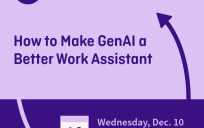Questions are not inherently neutral. They carry context, tone (if spoken), assumptions, and bias. If you’re working with customer (CX) or employee (EX) experience, asking questions is a necessary part of gathering feedback. Without considering the assumptions encoded in your questions, you could be inadvertently contaminating the feedback you’re collecting. Let’s discuss a couple of the ways that questions make assumptions and how to avoid them when collecting feedback.

Presupposition and Implicature
My friends and family joke that I never use my linguistics degree, but here we are: presupposition and implicature apply to asking questions in CX and EX! These terms sound overly formal, but are familiar concepts to most people when defined.
Implicature is when something is suggested (which may or may not be true) without explicitly saying it. Social norms and context usually fill in the gaps here, although implicatures can sometimes be unintended. In the question “Are John and Jane dating?”, it is implied that John and Jane are dating each other. But, that doesn’t necessarily have to be true. There could be a context in which John and Jane are each dating other people.
Presupposition is similar to implicature (something is suggested without saying it), but unlike implicature, this implicit condition must be true. In the question “Is John’s spouse coming to dinner?”, we presuppose is that John is married. This condition must be true or else saying John has a spouse would not make sense. This question also has an implicature: Some people may interpret that John’s spouse is a wife, whereas John may have a husband. So, although the presupposition that John is married must be true, the implication that his spouse is a wife or husband is unknown.
Linguistics 101 lesson aside, the questions we ask are loaded with cultural, linguistic, and context-specific information. In everyday speech, we handle this information on the fly without thinking too much about it. Questions with deliberate presuppositions and implicatures are used in legal and marketing fields (for example, questions such as “How long have you been committing fraud?” implies that the person is already guilty of fraud). But when we are conducting research or gathering feedback, the way we ask questions impacts the types of answers we get.
Being Mindful About Questions
When asking for customer or employee feedback, we want to take the opposite view of the attorney. That is, we don’t want to push the person towards an answer that benefits us. We want to leave the questions as neutral and open as possible. This not only lessens the potential for undue influence on the person’s answer, but also leaves room to discover details that weren’t on your radar. Here are a couple tips:
- When asking closed questions (such as yes/no questions), which are common on surveys, be careful not to make assumptions that may not apply to that person
- For example, if you ask someone “Do you have a husband?”, you are implying that a husband is the only option for their spouse. If the person answers “no”, it’s unclear if they do not have a husband or if they do not have a spouse at all.
- Sometimes answers exist in between yes and no. Consider including options such as “Maybe”, “I’m not sure” or “Not Applicable” with the option for them to explain their answer. These details can provide insights beyond a simple binary answer
- When asking open-ended questions (i.e. questions where there are no option answers), be mindful not to make assumptions about that person’s experience before those details are revealed to you
- If you are asking about someone’s experience in the workplace and you ask “What is the worst experience you have had at the office?” or “Who is your favorite coworker?”, this presupposes they have had negative experiences and have chosen favorite coworkers. To make these questions more neutral and expansive, you could ask
- “Can you tell me about a memorable experience you’ve had at the office?” –> This leaves space for negative and positive experiences
- “What is your relationship like with your team?” –> This question does not assume favorites or personal relationships, but leaves room for them if they are relevant
- If you are asking about someone’s experience in the workplace and you ask “What is the worst experience you have had at the office?” or “Who is your favorite coworker?”, this presupposes they have had negative experiences and have chosen favorite coworkers. To make these questions more neutral and expansive, you could ask
When asking for feedback, many people will answer the exact question you ask. So, my question for you is: Are you asking questions that leave space for nuanced and expansive answers?
Ann Aly (pronounced like Ali) is a UX and civic tech practice leader with a background in academic research, music, and education. She combines these experiences to lead teams improving federal government services, emphasizing communal leadership and transparency. Ann holds a PhD and MA (both in Linguistics) from UCLA, and an MA (Spanish and Portuguese) and BA (Music) from Florida State University. When she’s not asking too many questions, Ann enjoys woodworking, gardening, and exploring the Shenandoah Valley woodlands near her home.





Leave a Reply
You must be logged in to post a comment.